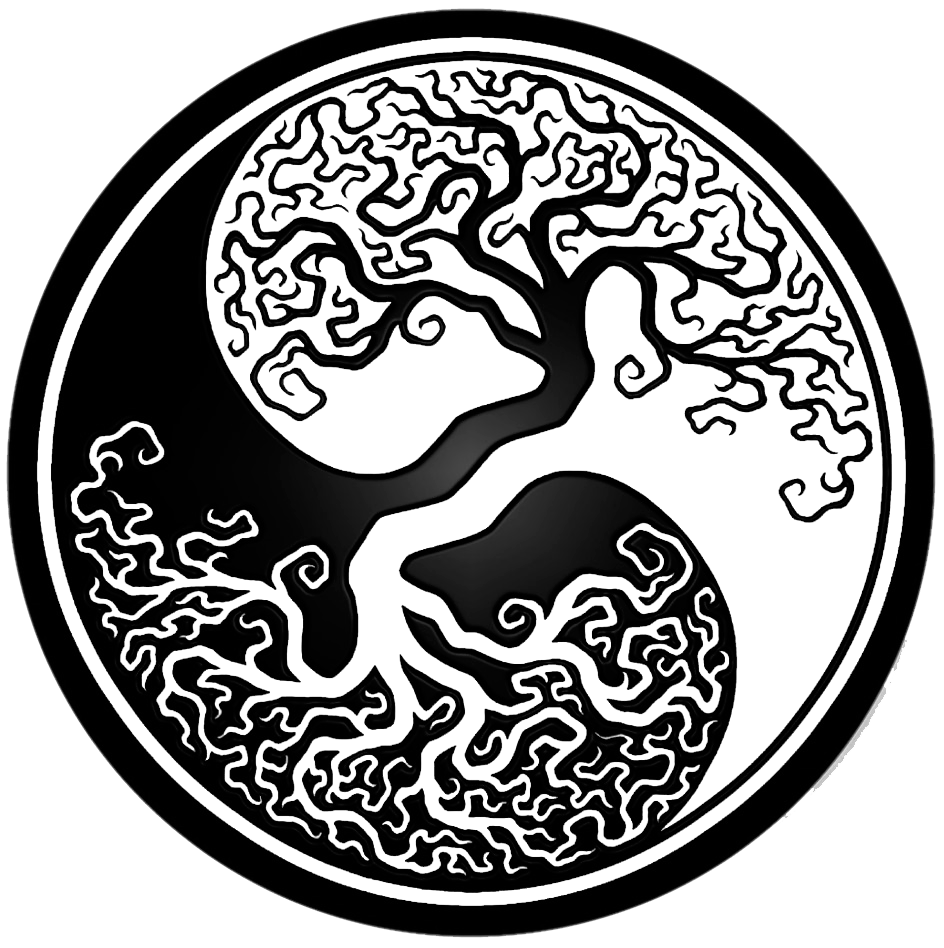
It is no longer a secret that proper nutrition plays a vital part in maintaining good health. But when Hippocrates, the father of modern medicine, first proclaimed ‘Let Your Foods Be Medicines and Your Medicines Be Food’ he wasn’t just talking about nutrition. Instead, he was implying that the distinction between staple foods, vegetables, spices, herbs, and drugs are often rather arbitrary. He knew very well that many common foods have healing properties, yet, are much safer to use than chemically more potent drugs.
Even today, the kitchen cupboard can be a veritable medicine chest. Let’s consider the medicinal properties of some common staple foods and vegetables:
Grains
Although some regard them as the root of all evil and shun them for their ‘fattening’ properties, grains and starches are an important part of a balanced diet. The operative word here is ‘balance’. Too much of a good thing can be, well, too much. Also, not all starches are created equal. Processed carbohydrates really are empty stuffing. White flour products including bread and pasta, polished rice and fried potatoes have little to commend them and contribute almost nothing but calories to the diet. Yet, the same items, less processed, form ‘the staff of life’.
They not only supply energy in the form of complex carbohydrates but also provide a large range of nutrients. They are rich in fiber, too, which is especially important for maintaining a healthy digestive system. Fibers, especially the water-soluble kind, eliminate toxins and keep cholesterol levels low. However, they should not dominate the diet. The amount of carbohydrates you need depends on how much physical energy you have to put out on a daily basis. People who live a more or less sedentary lifestyle need far fewer carbs to keep their burner going.
Grains also have medicinal properties that are very versatile. They are not used in herbal medicine today, but rather as home remedies:

Barley (Hordeum vulgare)
Barley gruel is an excellent nutritional food that is useful for throat and stomach problems. Boiled in milk it promotes lactation. Externally, it can be used as a poultice to treat sprained or stiff muscles, rheumatism, and skin afflictions. Simmered in milk it soothes sores and ulcers. Even Barley beer has its virtues: it stimulates the appetite and increases the secretion of digestive juices. It improves the digestion of fatty foods and eases heartburn. Warm beer acts as a demulcent and diuretic and has been used to alleviate urinary complaints.
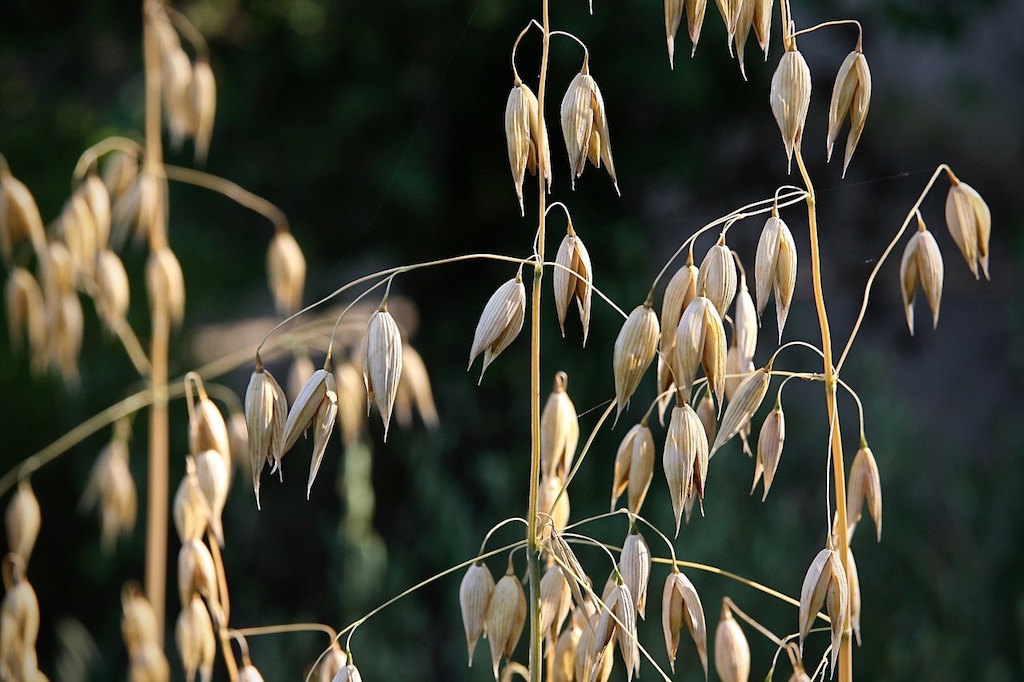
Oats (Avena sativa)
Oats are very nourishing and provide an excellent source of energy for those who are recovering from sickness or are in poor health. Plain oat porridge is one of the best foods for stomach and intestinal problems such as ulcers and inflammation. Oat bran is an excellent source of water soluble fibre that acts as an inner cleanser, adding bulk while binding endotoxins for elimination.
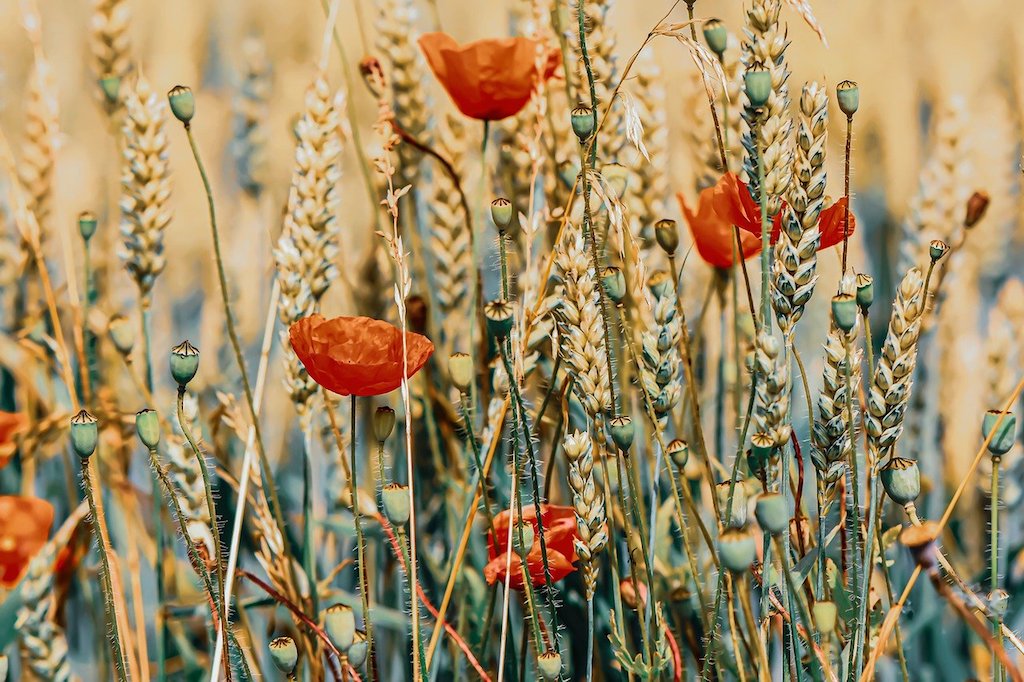
Wheat (Triticum sativum)
Wheat is one of the most important staple foods of the Western diet. However, the highly refined and bleached form commonly used for bread and pasta provides almost no nutritional value. Moreover, wheat allergies are becoming increasingly common. Spelt offers a good, less allergenic alternative.
Externally, pure, unadulterated wheat starch has been used as a drying agent. The soothing powder can be applied to weeping skin rashes and inflamed sores (poison ivy!). Those who are allergic to wheat should not use it for external applications either.
Wheatgerm is nutritionally the most valuable part. It is rich in vitamin E as well as other nutrients. It has been used to alleviate debilitating or nervous conditions, circulatory problems, digestive troubles, blood impurities, and skin afflictions.
Wheat bran is used as laxative or diet aid since it creates a sense of satiation. But as wheat bran is not water-soluble it does not bind endotoxins. While it adds bulk, the sharp edges of coarse bran can irritate the intestinal lining. Wheat bran offers little to no nutritional benefit. However, externally it can be used as a bath additive for rheumatic, gout, and certain skin problems (put in a muslin bag or similar if you don’t want your drains to clog up). . Mixed with honey it makes a good face-mask for treat blackheads and skin impurities.
Vegetables
Vegetables are the best source of vitamins, amino acids, minerals and other trace substances that are vital to our health. Vegetables are essential, yet too much of a good thing can be too much, in this case too. Fat-soluble vitamins are stored in the body and can be toxic if they accumulate in excessive amounts. Too much asparagus can damage the kidneys and spinach can draw calcium from teeth and bones. But as vegetables are rarely eaten in really excessive amounts, damage is rare.

Onion (Allium cepa)
The onion family provides a host of wonderful and medicinally potent vegetables. Even the lowly onion has antiseptic and anti-putrefactive properties. It stimulates circulatory system including the heart, has diaphoretic, diuretic and expectorant properties, and increases mucous secretion.
To make an impromptu cough syrup, simply cut up an onion and sprinkle with brown sugar. Cover the dish and leave overnight. The sugar draws out the onion juice and makes a kind of syrup.
Onion juice stimulates the kidneys and helps to dissolve small kidney stones. However, this should not be tried in cases of kidney inflamed or serious kidney disease, as it can be irritating.

Garlic (Allium sativum)
Garlic is an excellent home remedy. It has antiseptic and antibiotic properties and stimulates the immune system. Garlic is also excellent for keeping the circulatory system healthy as it reduces cholesterol levels, inhibits arteriosclerosis and lowers the blood pressure (vasodilator). It is full of vitamins and healthy nutrients. It can even kill worms (enema). It also stimulates the liver and gallbladder and acts on the metabolism. Cooked in milk it is a powerful expectorant. Garlic juice was once used as a remedy for tuberculosis.

Asparagus (Asparagus officinalis)
Asparagus stimulates the kidneys and increases the urinary volume. Asparagus contains a lot of purines though, which can contribute to the formation of uric acid crystals. While this is not normally a problem, people who eat a lot of organ meats may already have elevated levels of purines. In that case, it would be better to not overdo it with the asparagus.
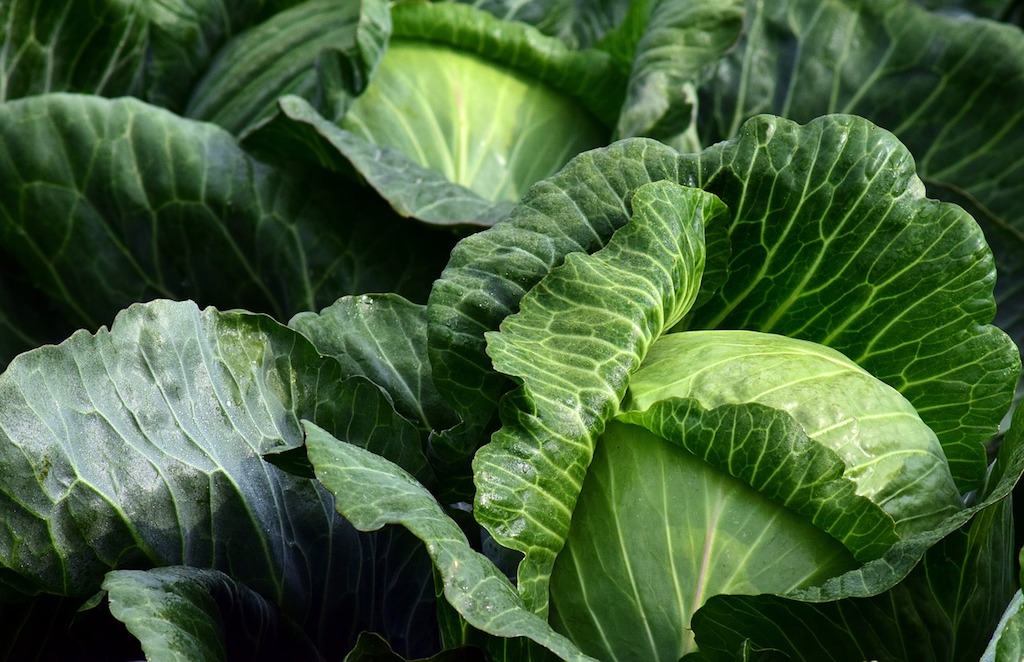
Cabbage (Brassica oleracea capita)
Rich in vitamin C, the lowly cabbage is another wonderful healing plant. Sauerkraut and raw cabbage are great detoxing agents. Fresh cabbage juice, (5x a day for 2 weeks) is an effective remedy for stomach ulcers. Bruised cabbage leaves, applied as a poultice, draws pus and putrid matter from rashes, sores, and boils. Applied to the chest it can be used as a pulmonary plaster for bronchial infections. It can also be applied to engorged breasts. Hot cabbage leaves soothe aching muscle, neuralgia, and rheumatic pain.
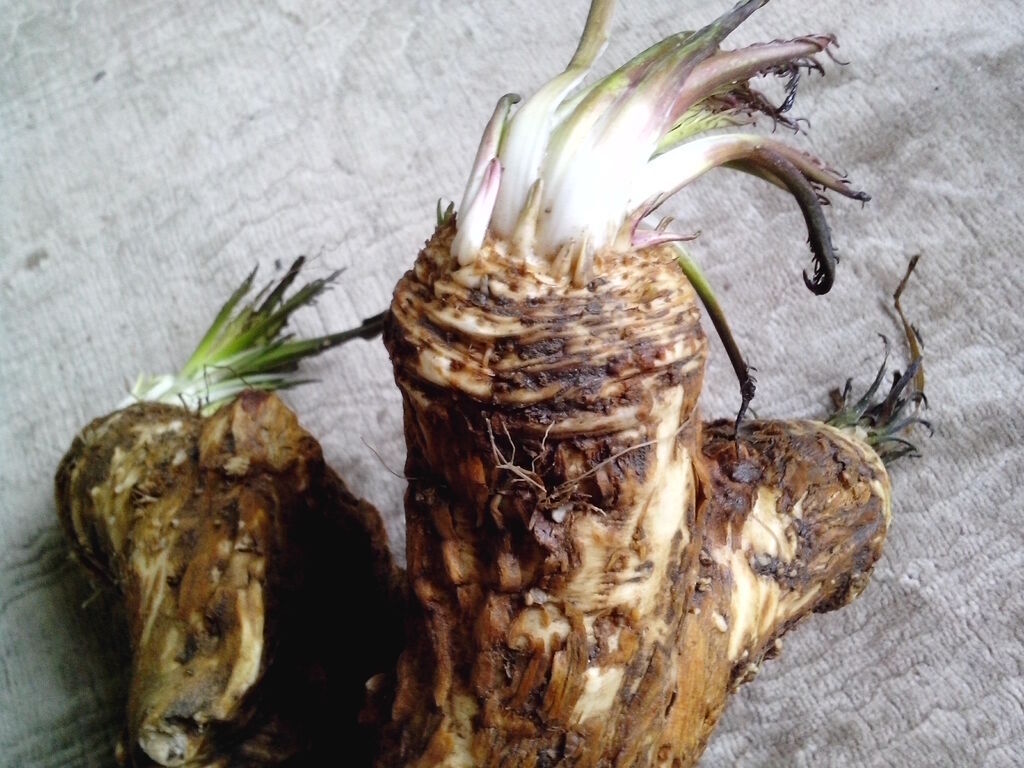
Horseradish (Amoracia rusticana/ Cochlearia armoracia)
Horseradish has a stimulating effect on the circulatory and the digestive systems and boosts the metabolism. It can be used both internally and externally: Applied as a poultice it will act as a rubefacient and soothe aching muscles, gout, rheumatic joints, neuralgic pain, and sciatica. For a more convenient application use the tincture. A dab on the forehead can prevent migraines.
Horseradish mixed with lemon juice can halt an asthma attack – though this remedy is not for the faint of stomach. Added to a pint of ale and sweetened with sugar it makes a powerful diuretic remedy that can be used to treat edema. Steeped in wine and taken in teaspoonful doses it is an anti-catarrhal for the respiratory and digestive system. When using Horseradish internally it is best to start with small quantities. Monitor the effects closely. Too much of it can be rough on the kidneys.

Carrot (Daucus carota)
Carrots offer one of the best sources for vitamin A. They are wonderfully vitalizing and boost the immune system. Carrot juice cleanses the intestinal tract and is an excellent remedy for excessive stomach acid and heartburn. It is also good for rheumatism and arthritis and acts positively on sugar metabolism in cases of diabetes. Externally, grated carrots can be applied to bruises, burns, and sores.

Celery (Apium graveolens)
Celery sticks are an excellent diuretic and are popular as a diet food. The fresh juice stimulates urination, relieves edema, rheumatism, gout and cellulite. It is a good digestive aid, recommended for indigestion, lack of appetite and wind. In Continental Europe it is the root rather than the sticks that is more commonly used in cooking. The water in which celery root has been boiled can be used as a rinse for treating dandruff. The syrup, made by boiling the root juice with sugar, makes an excellent cough remedy. However, avoid celery remedies when in cases of kidney inflammation, since its diuretic action may prove too irritating. The seeds provoke delayed menstruation and should be avoided during pregnancy.

Cucumber (Cucumis sativus)
Cucumber is commonly used in home cosmetics to moisturize dry skin. Used externally, the juice is refreshing, tonic, cleansing, and soothing especially on sunburned, dry, or tired skin.
But Cucumber also has medicinal properties: it regulates hydration, acts as a diuretic, and loosens kidney stones. It is useful in cases of edema and cellulite and stimulates lazy intestines.

Pumpkin (Curcurbita pepo)
Pumpkin is rich in vitamin A and B. For medicinal purposes it is only used raw. Mashed pumpkin soothes sore feet, inflamed ulcers, sores and varicose veins. It has blood cleansing powers when added raw to a salad, which soothes the symptoms of kidney inflammation. Pumpkin seeds are one of the most effective and non-toxic worming agents. They are also rich in Zinc and as such are particularly beneficial for bladder and prostate problems.
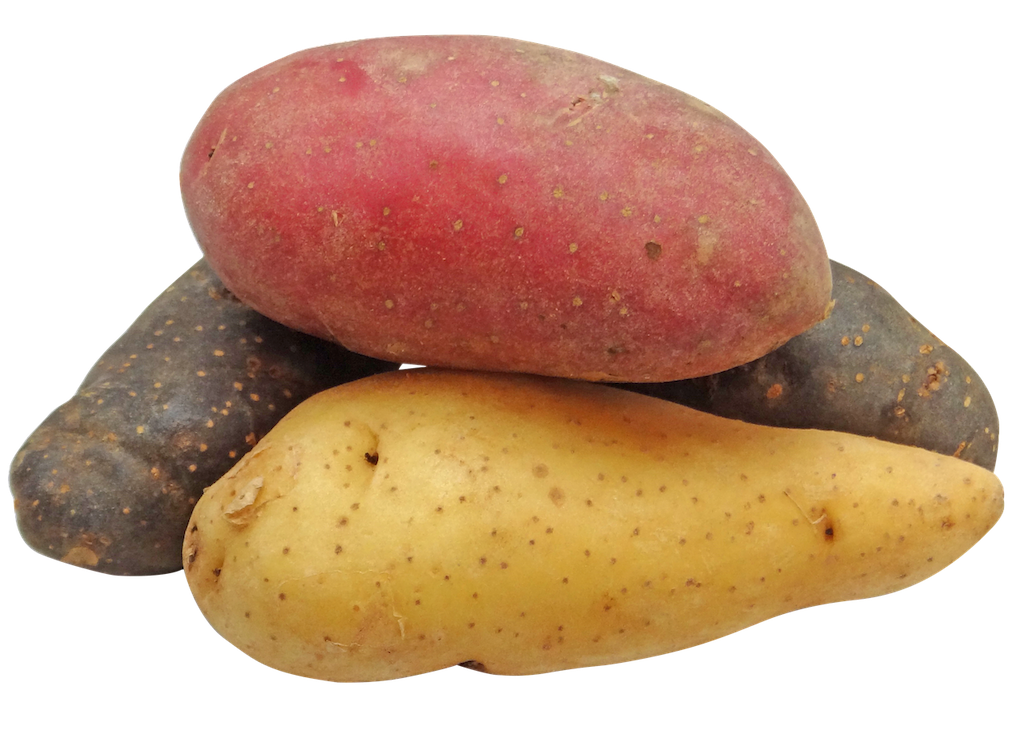
Potato (Solanum tuberosum)
Potatoes are rich in vitamin C and extremely nutritious. A time limited diet, consisting of little more than mashed potatoes (without salt) relieves stomach problems associated with intestinal cramps and constipation. Used externally, raw, mashed potatoes are anti-inflammatory and can be applied to cankerous growths and sores.

Tomato (Solanum lycopersicum)
Tomatoes stimulate the digestive juices and help to alleviate stomach ulcers and liver complaints. They also have a positive effect on edema, neuritis and circulatory issues, and especially on the peripheral blood vessels. Applied externally, fresh tomato juice applied to wounds can help to prevent infection and relieves inflammation.
Fruit
Delicious and wholesome, but very high in fruit sugar, fruits boost vitality and provide a rich source of nutrients and trace elements.

Lemon (Citrus medica)
Nothing soothes a cold better than hot lemon with ginger and honey. Lemons are extremely rich in vitamin C and act as a powerful immune system booster. Their diaphoretic action helps to cool a fever. As a gargle, lemon juice is a very useful astringent that can help to soothe a sore throat. Though perhaps not the most pleasant therapy, nose irrigation with diluted lemon juice cures even severe cases of nasal catarrh (e.g. allergies). It also supports the liver (breaks down fats), stimulates digestion and acts as a diuretic to flush out metabolic waste products.
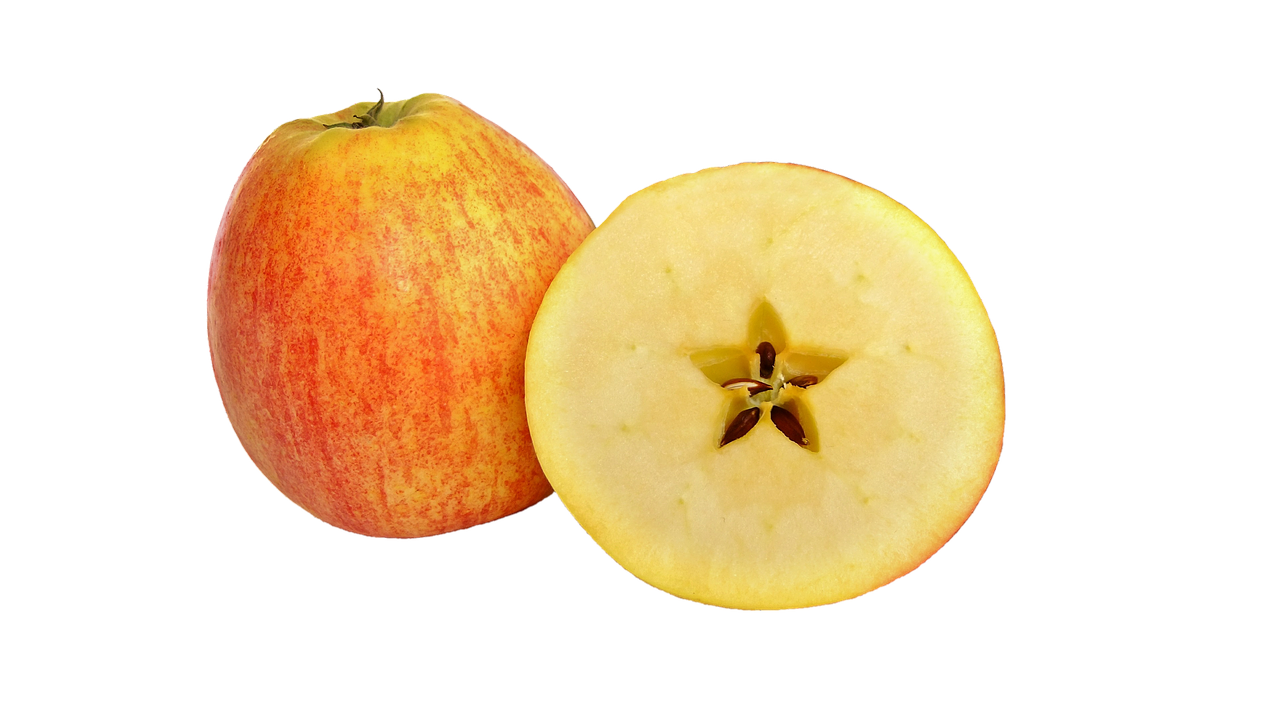
Apple (Fructus malus)
‘An apple a day keeps the doctor away.’ Whoever coined the phrase knew what they were talking about. Apples are nutritious and cleansing. They stimulate the circulatory system and metabolism. Apple therapy is indicated for migraines, gout, acidic stomach complaints, constipation, and biliousness, as well as for gout and rheumatism. Apple juice or apple flower tea is beneficial for coughs and colds, hoarseness, bronchial catarrh, and fever.
Apples soothe the nerves. Eaten at bedtime they promote restful sleep.
Apple cider vinegar is a most remarkable remedy for arthritis, gout, sinus catarrh, high blood pressure, migraine, chronic tiredness, and night sweats. Taken regularly diluted with water (sweeten with honey) it is one of the best anti-rheumatism remedies. It is rich in calcium and helps to improve memory and concentration, muscle strength, circulatory problems, badly healing wounds, itchy skin, joint pains, and lack of appetite. Apple wine has been shown to prevent kidney and bladder stones.

Blueberries (Vaccinium myrtillus)
Blueberries are a cleansing and tone the digestive system. The dried berries simmered in wine with Cinnamon and Cloves makes a wonderful, fortifying, and warming remedy for indigestion and other stomach and intestinal troubles. Blueberry wine eliminates endotoxins without disturbing the intestinal flora. (Blueberry wine = blueberries steeped in wine for a period of time, usually 4-6weeks) Fresh blueberry juice can be used as a gargle for throat infections and as a mouthwash for periodontal disease. Externally, an infusion of the leaves is a useful aid for treating the loss of hair. Blueberries have antioxidant properties and help to fight tumors by scavenging free radicals. The concentrated extract can help to increase circulation to the small blood vessels and can help to alleviate the retinal degradation caused by diabetes.
This list is by no means a comprehensive guide and should not replace a visit to the doctor. It is only meant to give a small glimpse into the remedial properties of common foods. When using any plant for medicinal purposes make sure you have familiarized yourself thoroughly with its properties and possible side effects.
Further resources:
The worlds healthiest foods (ext. link)
